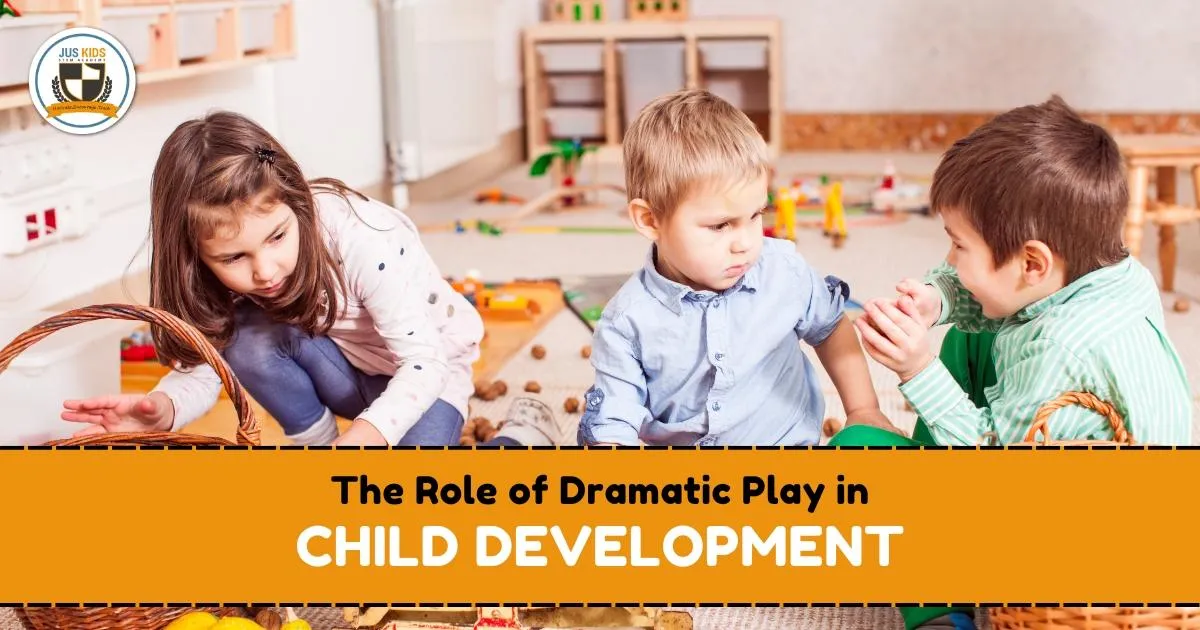
How Dramatic Play Builds Skills in Early Child Development
“She picked up a banana and called it a phone, then confidently said, ‘I’m calling the doctor!’”
Sound familiar? That’s not just play, it’s learning in disguise.
We often underestimate the power of pretend. Parents see it as cute. Teachers sometimes see it as a break between lessons. But what if that imaginary tea party or superhero mission is exactly what children need for serious developmental growth? At Jus Kids Academy, where nurturing creativity meets structured learning, dramatic play isn’t a filler activity; it’s a foundational tool that shapes how young minds grow.
Let me tell you about Zoe, a four-year-old who barely spoke in class. Quiet, reserved, often in the corner during circle time. But something shifted the day she slipped on a firefighter’s jacket in the dramatic play center. Suddenly, she had a mission. She rescued stuffed animals, ordered her friends to safety, and shouted, “Fire’s out!” That moment wasn’t just cute, it was a breakthrough. Through dramatic play, Zoe found her voice.
That’s the magic of pretend play. It helps children communicate, explore feelings, solve problems, and learn about the world around them, without even realizing they’re doing it. Let’s look deeper into why this kind of play matters and how it sets the stage for lifelong growth.
What Is Dramatic Play?
Dramatic play is when children take on roles and act out stories. It can be planned or spontaneous. Think playing house, running a pretend grocery store, dressing up as a doctor, or reenacting a bedtime story. It allows kids to experiment with different roles, scenarios, and emotions in a safe, imaginary space.
And it’s not just for fun (though it is fun). This kind of role-playing engages a wide range of developmental skills. Children practice communication, self-regulation, empathy, planning, and problem-solving, all under the radar of “just playing.”
Why Dramatic Play Deserves a Spotlight in Early Learning
Most adults remember playing make-believe as kids. But somewhere along the way, we started favoring worksheets over costumes. That’s a shame because dramatic play isn't fluff, it’s functional.
It taps into children’s imagination, which is more than daydreaming. It’s a tool that helps kids make sense of their world. When a child pretends to be a doctor, they’re processing what it means to care for others. When they act out a family scene, they’re exploring relationships, communication, and emotions.
Dramatic play gives kids power. They get to control the narrative, make decisions, solve problems, and learn from mistakes, all things that boost confidence and independence.
Dramatic Play and Emotional Growth
Imagine your child playing the role of a parent scolding a misbehaving teddy bear. What’s happening there? They're processing discipline, authority, and even guilt or forgiveness.
Through dramatic play, children learn emotional intelligence. They try on feelings, understand consequences, and build empathy. It gives them a safe space to express frustration, joy, fear, or love, and that expression supports healthier emotional development in the real world.
Art therapy often uses similar techniques. Just like painting a picture can help a child work through a feeling, pretending to be a superhero facing danger can help them process fear. Drama is therapeutic when it invites children to explore emotions without judgment.
Language Development and Communication Skills
If you’ve ever eavesdropped on a preschooler's pretend kitchen game, you know the dialogue can be… surprisingly detailed. “We’re out of eggs! Call the store!” or “You’re the customer, and I’m the chef!”
This back-and-forth builds communication. In dramatic play, children learn how to ask questions, make requests, describe what they’re doing, and respond to others, all key aspects of early literacy.
It’s not just about vocabulary. They’re also learning about tone, volume, and nonverbal cues. That’s why shy kids often shine in role-play. It gives them a script, a setting, and a sense of control, without the pressure of “performing” in real life.
Dramatic Play Supports Fine Motor Skills
Here’s where it gets surprisingly physical. From buttoning doll clothes to writing menus for a pretend restaurant, dramatic play quietly strengthens fine motor skills.
Consider the small movements involved in:
Pouring imaginary tea into tiny cups
Cutting paper food for a pretend meal
Drawing signs or tickets for a puppet show
Using tools at a pretend doctor’s office
These tasks build hand-eye coordination, finger strength, and precision, all essential for later tasks like handwriting, using scissors, or tying shoes.
So yes, pretending to feed a baby doll has real physical benefits too.
Imagination Meets Creative Expression
When children create stories, act out scenes, or design props, they’re not just playing; they’re expressing themselves. And creative expression is a big part of healthy cognitive development.
Unlike rigid academic tasks, dramatic play lets kids experiment. There’s no “wrong” way to pretend. This freedom builds confidence and encourages experimentation, which is why imagination is considered one of the strongest predictors of problem-solving and innovation later in life.
Even better, it often spills over into other creative areas like drawing, music, or storytelling.
Craft Activities That Pair Perfectly with Dramatic Play
Want to take dramatic play to the next level? Bring in craft activities. Creating props, costumes, and backdrops boosts both creativity and ownership.
Examples:
Making paper crowns for a royal play
Designing animal masks for a jungle adventure
Building cardboard houses, spaceships, or castles
Drawing menus or tickets for a pretend store or movie theater
These activities aren’t just fun, they reinforce artistic development while giving kids the tools to expand their imaginary worlds.
It’s the perfect marriage of dramatic play and hands-on creativity.
How Music Education Boosts Pretend Play
Don’t forget the soundtrack. Music education blends beautifully with dramatic play by setting the scene, building mood, and inspiring movement.
Imagine a child pretending to be a dancer or a jungle explorer. Add rhythmic drumming, classical music, or even silly songs, and suddenly the play deepens. Music can inspire characters, stories, and emotional tones.
It also supports memory, timing, and coordination. Plus, let’s be honest, it makes everything more fun.
Pairing music education with dramatic play gives children even more ways to express themselves.
Art Therapy and Dramatic Play: A Perfect Pair
While art therapy is often used in more clinical settings, its overlap with dramatic play is undeniable. Both involve symbolism, emotional expression, and safe exploration of complex ideas.
In early childhood education, incorporating drawing, painting, or sculpting into pretend play can help children explore feelings in a low-pressure way.
Let’s say a child builds a “sad monster” from clay, then acts out a story where the monster learns how to make friends. That’s more than creative, it’s cathartic. It allows the child to process emotions through storytelling and art.
So yes, dramatic play can be healing too.
Encouraging Dramatic Play at Home and School
The best part? You don’t need expensive toys or elaborate costumes. Kids can turn a cardboard box into a spaceship, a stick into a magic wand, and a blanket into a superhero cape.
To support dramatic play:
Give them open-ended materials (scarves, hats, boxes, paper)
Create a small pretend center with rotating props.
Join in sometimes, but follow their lead.
Ask questions like, “Who are you today?” or “What happens next?”
Whether at home or in the classroom, children thrive when their pretend worlds are supported and valued.
Final Thoughts
At Jus Kids Academy, we don’t treat dramatic play like downtime. We know it’s prime time for building the skills kids need to grow socially, emotionally, creatively, and academically.
From strengthening fine motor skills to exploring creative expression, dramatic play lays the groundwork for lifelong learning, and it does so with joy, imagination, and laughter.
So the next time you see a child wearing a colander on their head and declaring themselves King of the Moon, don’t just smile. Pay attention. You might be witnessing the early development of a confident communicator, a thoughtful problem solver, or even a future leader.
Let’s give dramatic play the spotlight it deserves and keep the learning fun.
Want to see how we support dramatic play every day at Jus Kids Academy?
Visit us at Jus Kids Academy and schedule a tour to experience the joy of learning through imagination.
FAQs
At what age should dramatic play be introduced to children?
Dramatic play naturally begins around age two when children start to imitate adults. By preschool age, they can engage in more complex role-play. Early introduction encourages communication and creativity.
2. Can technology be part of dramatic play, or does it interfere?
When used sparingly and thoughtfully, technology like storytelling apps or soundtracks can enhance play. However, traditional open-ended play materials are still more effective for imagination and social development.
3. Is dramatic play beneficial for children with learning differences or autism?
Absolutely. With guided support, children with learning differences or autism can use dramatic play to improve language skills, emotional awareness, and social interaction in a safe setting.
4. How can teachers or parents guide dramatic play without taking over?
Offer gentle prompts or props, but let the child lead the storyline. Ask open-ended questions like “What happens next?” to encourage deeper thinking without dictating the play.
